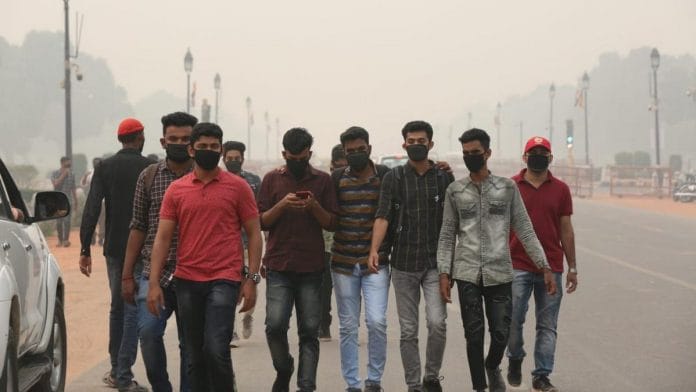New Delhi: The toxic smog that engulfed most of north India in the winter of 2019 pushed the Narendra Modi government to allocate a massive Rs 4,400 crore for clean air initiatives in the Union Budget this year — an increase of Rs 3,940 crore from the amount granted in 2019-20.
In the last Union Budget presented in July 2019, Union Finance Minister Nirmala Sitharaman had allocated Rs 460 crore for pollution control schemes.
Track live updates on Union Budget 2020 here
“In large cities with a population of over 1 million, clean air is a matter of concern. The government proposes to encourage such states that are formulating and implementing plans for cleaner air in cities with a population of over one million,” Sitharaman said in her speech in Parliament Saturday.
This marks the second consecutive year when the budget allocation for pollution-related schemes has been increased substantially. In the financial year 2018-19, the allocation for such schemes was a mere Rs 5 crore.
Parameters for the “incentives” will be notified by the Ministry of Environment, Forest and Climate Change, the finance minister said.
The total allocation, meanwhile, for the Ministry of Environment, Forest and Climate Change has been increased to Rs 3,100 crore from Rs 2,657 crore in the last fiscal. This figure is over and above the Rs 4,400 crore.
NDC for Paris accord to be implemented from 2021
Despite satellite data showing that the majority of north India remains highly polluted in the winters, most cities do not have sufficient air quality monitors to collect on-ground data.
This data is vital for any city to be included in the National Clean Air Programme (NCAP) — a national-level strategy launched by the environment ministry last year. The programme lays out city-specific five-year plans to tackle air pollution.
Currently, the NCAP lists only 122 cities where air pollution needs to be tackled, but at least 231 cities exceed the acceptable limits of PM10 and need to be included in the NCAP.
PM10 are tiny particulate matter of diameter 10 or less than 10 microns that can enter deep into the lung.
The finance minister, meanwhile, also announced that India’s nationally determined contributions (NDC) made in 2015 for the Paris Agreement will be implemented from 1 January 2021.
In the Paris accord, each country submitted “nationally determined contributions”, stating the cuts they are willing to make in greenhouse gas emissions, largely through carbon pricing and renewable energy.
“There are yet thermal power plants that are old and their carbon emission levels are very high. The utilities running them will be advised to close them if emissions exceed acceptable standards. The land so vacated would be put to other uses,” Sitharaman said.
Also read: Lower income tax rates but no deductions — Modi govt creates optional second tax system







the increase of 460 crore amounts to just 10% of the total. that much is given just for the inflation rate. Actually no increase of spending has happened.